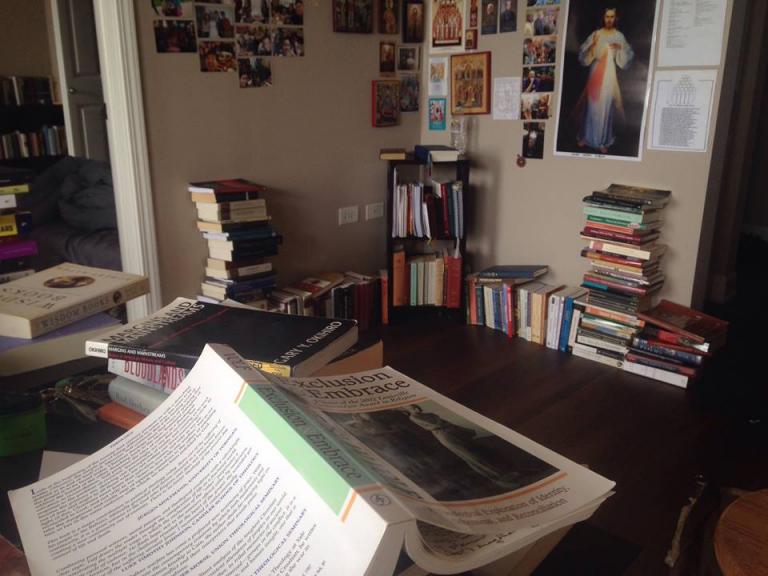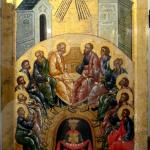
Sister Vassa (Larin) has begun a podcast series on Psalm 50. When I was a Protestant, I knew it as Psalm 51.
I like what Sister Vassa has to say about the psalm. She reads it as the prayer of a guy who is eaten up by guilt. Indeed, the psalm is about King David’s internal messiness after committing adultery with Bathsheba and having her husband Uriah the Hittite killed. But it is also a liturgical prayer, which means that it is not only about David. It’s about us too when we are wracked with guilt and shame, which Sister Vassa points out leads to paralysis and a lack of productivity in everyday life. Swallowed up with guilt, we don’t want to see the face of G-d, we do not want to interact with our neighbours, and we don’t want to do our work. It is not until we realize that the G-d we cannot see has revealed himself to us as mercy that we come back into his loving embrace. The creation of a clean heart is not my own effort in scrubbing away the guilt that has accumulated and infested there. Instead, it is the Lord’s mercy that cleanses us from that infestation. What we have to do is to bask in that mercy. As Sister Vassa keeps saying in her podcast about our merciful Lord, ‘We need to say to God, “God, do your thing!”‘
Sister Vassa’s emphasis on the relationship between G-d’s mercy and the clean heart are helpful to me. It helps me to articulate some of my misgivings about what is probably turning out to be my own misreading of what the evangelical theologian Miroslav Volf calls the ‘politics of the pure heart.’ Let me explain, though I may need a few more posts to write myself to clarity.
When I was an Anglican Christian, I was very taken with Volf’s postmodern theological formulations in his book Exclusion and Embrace. Hailed as a successor to the work on theological liberation done by the Protestant theologian Jürgen Moltmann, Volf’s text questions whether or not liberation theology is still practical in a postmodern age. The misapplication of liberation, he points out, could be deadly. Just like in his native Croatia, the assertion that one is free to be whoever they want to be can lead to a crystallization of an identity framed against an ‘other,’ who is quickly framed as an enemy. This logic served as the justification for ethnic cleansing when Yugoslavia broke up. Sarajevo burning turned out to be the avatar of how ethnic liberation in the 1990s could go devastatingly wrong.
For Volf, this mixing of categories is symptomatic of a postmodern age. The lines between ‘oppressed’ and ‘oppressor’ become fluid here, devastatingly so, which means that the setting free of the oppressed from oppressive colonization that was a hallmark in the liberation theology of yesteryear is outdated. For Volf, the metanarrative is dead; he sees nothing to give coherence to these categories of oppression.
That’s when he re-reads the Gospels to find that the statements of Jesus are directed to a colonized people, the Jews in first-century Palestine under Roman occupation. Volf argues that it is not the oppressive colonizers who are told to repent, but the victims of colonization:
Why does the call to repentance include the oppressed (in addition to the oppressors who are incomparably greater transgressors)? Why the talk of their sin and forgiveness? Because little “Jihads” along with their mothers and fathers need not only material and psychological help, but release from the understandable but nonetheless inhumane hatred in which their hearts are held captive. Put more generally and more theologically, victims need to repent because social change that corresponds to the vision of God’s reign – God’s new world – cannot take place without a change of their heart and behavior. Granted, many a false prophet used the message of repentance to stabilize the order of oppression: “the religion of the sinful soul” served to divert attention from “the economics of dirty deals” and “politics of ruthless power.” We would be unwise, however, to let this outrageous misuse blind us to the extraordinary social significance of the victim’s repentance. If it did, in our own way we would be guilty of the same sin the false prophets are guilty of – we would perpetuate the old order of oppression while self-righteously declaring ourselves the vanguard of the new order of liberty. Let me elaborate on what may be called “the politics of the pure heart.” (Volf, Exclusion and Embrace, pp. 114-5).
Volf’s diagnosis of the problem of colonizing oppression is similar to what we find in minjung theology – the theology of the people – in 1970s Korea. As the theologians of the minjung put it, the mass revolt against the capitalist dictatorship of Park Chung Hee was taking place as an expression of the han of the people, the compounded hate wrought by the oppressiveness of a developmentalist ideology that dehumanized them into cogs of a global economy instead of treating them as persons with agency to love. But Volf departs from liberation theology, including the minjung, by saying that Jesus calls those very victims to repent of the hatred in their hearts. Interestingly, this is similar to David Bentley Hart’s translation of metanoia in the Gospels. Usually, it’s translated ‘repent.’ Hart writes instead, ‘change your hearts.’
For Volf, the ‘politics of the pure heart’ is a politics that people who have experienced oppression should be activating. Instead of focusing on the hatred of the enemy, the oppressed in Volf’s view should be letting go of the cesspool of their anger, changing their hearts, and embracing the other in acts of forgiveness and reconciliation. This is why the book is called Exclusion and Embrace: the point is to move from a politics of exclusion found in liberation theology and to go toward embracing the enemy.
I was very taken by this formulation as an Anglican Christian still involved in evangelical circles. In fact, I read Exclusion and Embrace thoroughly in the first year of my doctoral program, along with John Howard Yoder’s Politics of Jesus. At that time, I had become disillusioned with the infighting within the Anglican Communion, as well as in the Chinese evangelical church communities in which I had grown up. I was invited to blog for a site called A Christian Thing, and I wrote their under my pen name Chinglican at Table. There, I began to develop my own understanding of the politics of the pure heart, which resulted in a series of posts on how the dirty and messy politics of Anglicanism can actually foster inward cleanliness. Not unlike Volf – but probably departing from him too – I argued that the infestation of hatred within Anglicanism against other groups we might see as unorthodox should drive us to seek the purity of heart. It is only out of a pure heart that we can discern what is really going on, and that’s what will get us out of this mess. I now see that the Hong Kong Anglican Archbishop Paul Kwong was saying the same thing in his doctoral dissertation Identity in Community with regards to Hong Kong-China relations. Incidentally, that book relies heavily on Volf’s formulations in Exclusion and Embrace.
This formulation of the politics of the pure heart fell apart for me around the time of the Umbrella Movement in Hong Kong. In discerning with my spiritual father what happened, it occurred to us that what happened there was that my postmodernism fell apart. Volf’s formulations play well in the kind of postmodern age that the philosopher Jean-François Lyotard describes in The Postmodern Condition. For Lyotard, there is no longer a sense of what determines the veracity of a claim in the publics of highly advanced societies. What Volf does – and in turn, what Archbishop Kwong also does – is to take this condition as a given and to try to do theology in that kind of context. Interestingly, their formulations dovetail with the work of theologians aligned with what has been called ‘radical orthodoxy,’ to which I was also drawn in my doctoral studies, although I would not describe Volf and Kwong as part of that school of thought. The basic thrust of their argumentation, however, is that the confusion of liberal postmodern secularity should drive Christians to practice charity, forgiveness, and reconciliation at the small scale of the parish, especially with people we don’t like, usually because their ideologies are problematic. Hypothetically, these small-scale practices will generate a kind of politics of the pure heart to be practiced at grander scales.
But practically speaking, this kind of thing turns into a kind of people-pleasing fence-sitting. With the Umbrella Movement, I got off the proverbial fence. I betrayed my postmodern commitments. I named an oppressor and sided with the oppressed. I realized that Kwong’s usage of Volf was perpetuating a kind of oppression in Hong Kong, and I happily edited a chapter in my book Theological Reflections on the Hong Kong Umbrella Movement where my colleague Sam Tsang spelled that out.
Since then, I feel like I have been picking up the pieces of my broken theology. Part of that effort included joining an Eastern Catholic Church. Certainly, I am still invested in cultivating a pure heart; this is why I tell my friends that I am a frequent customer at the Holy Mystery of Repentance (what the Latins call ‘confession’). I still think that purity of heart is related to my practice of politics. But I have abandoned my commitments to seeing the postmodern condition as a given situation in which to practice theology. Instead, I am coming to see that what Lyotard describes in postmodern publics is the way that contemporary ideology is done: we are pressured to see all sides of a story and therefore not to have any political commitments at all. For me, this is unacceptable, but it also problematizes my older formulation of the politics of the pure heart.
Sister Vassa’s meditations are thus helpful to me in formulating where I am arriving. The pure heart is not my act; it’s God doing his thing. If that is the case, perhaps the problem is that the situation in which I need to locate my theology is not the postmodern condition. It is in the Lord’s ocean of mercy.
















